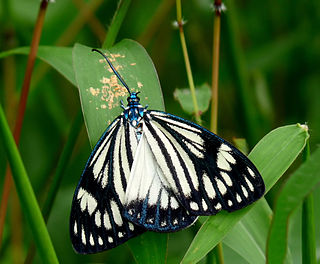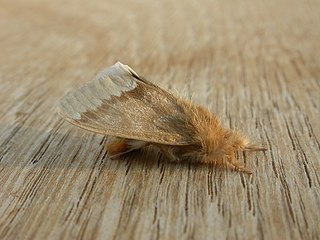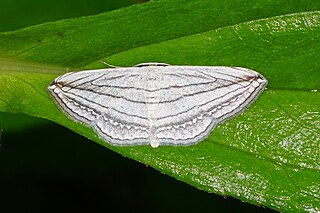
The Zygaenidae moths are a family of Lepidoptera. The majority of zygaenids are tropical, but they are nevertheless quite well represented in temperate regions. Some of the 1000 or so species are commonly known as burnet or forester moths, often qualified by the number of spots, although other families also have 'foresters'. They are also sometimes called smoky moths.

The Hepialidae are a family of insects in the lepidopteran order. Moths of this family are often referred to as swift moths or ghost moths.

The dryandra moth is a species of moth that is considered to be the sole member of the family Carthaeidae. Its closest relatives are the Saturniidae and it bears a resemblance to many species of that family, bearing prominent eyespots on all wings. The common name is derived from the Dryandra shrubs of the genus Banksia, on which the larva of this species feed, and is hence restricted to the south-west of Western Australia where these shrubs grow. Other Grevillea shrubs may also be used as host plants.

The Nacophorini are one of the smaller tribes of geometer moths in the subfamily Ennominae. They are the most diverse Ennominae of Australia and are widespread in the Americas. If the African genera tentatively placed herein indeed belong here, the distribution of the Nacophorini is distinctly Gondwanan, with their probable origin either of Australia, South America or even Antarctica. In Eurasia, they are rare by comparison.

Cephonodes hylas, the coffee bee hawkmoth, pellucid hawk moth or coffee clearwing, is a moth of the family Sphingidae. The species was first described by Carl Linnaeus in 1771. A widely distributed moth, it is found in the Near East, Middle East, Africa, India, Sri Lanka, Japan, Southeast Asia and Australia.

Hippotion velox, the dark striated hawkmoth, is a species of sphingid moth or the family Sphingidae. The species was described by Johan Christian Fabricius in 1793.

Asota is a genus of moths in the family Erebidae first described by Jacob Hübner in 1819. Species are widely distributed throughout Africa, India, Sri Lanka, Myanmar, the Malayan region and tropical parts of the Australian region.

Ectropis is a genus in the geometer moth family (Geometridae). They are mostly paleotropical, but also plentiful in Australia and extend into Asia. Only one species – or cryptic species complex – is found in Europe. There are about 100 known species in this genus.

Smyriodes is a genus of moths in the family Geometridae first described by Achille Guenée in 1857. Both species are known from Australia.

Speiredonia mutabilis is a species of moth of the family Erebidae first described by Johan Christian Fabricius in 1794. It is found in India, Sri Lanka, Vietnam, Taiwan, the Philippines, from Sundaland eastwards to Australia, the Solomon Islands, New Caledonia, Vanuatu, Fiji and Tonga.

Amplypterus panopus, the mango hawkmoth, is a moth of the family Sphingidae. The species was first described by Pieter Cramer in 1779. It is found in Sri Lanka, southern and northern India, Nepal, Myanmar, southern China, Thailand, Vietnam, Laos, Indonesia and the Philippines.

The Australian striped hawk moth is a moth of the family Sphingidae first described by the Scottish-born Australian medical practitioner, naturalist, author, philosopher and utopianist; Thomas Pennington Lucas in 1892. H. livornicoides was once a common food source for the Arrente community in Central Australia, however is not consumed anymore due to their sacredness and increasing scarcity. The local name for the caterpillar is 'Ayepe-arenye', often anglicised as 'Yeperenye' or 'Yipirinya'.

Euproctis baliolalis, the browntail gum moth, is a moth of the family Erebidae. The species was first described by Charles Swinhoe in 1892. It is found in the south-east quarter of Australia.

Serrodes campana is a species of moth of the family Erebidae first described by Achille Guenée in 1852. It is found from the Indo-Australian tropics to eastern Australia, Fiji, Samoa and New Caledonia. It is also present in Japan, Korea and Sri Lanka. The adult is a fruit piercer, but also feeds on flower nectar.

Scopula opicata is a moth of the family Geometridae first described by Johan Christian Fabricius in 1798. It is found in tropical Africa, including Malawi and Zambia, as well as in Sri Lanka, India, China (Hainan), Myanmar, Sundaland, the Philippines, Sulawesi, Timor and New Guinea.
Cryptophasa ochroleuca is a moth in the family Xyloryctidae. It was described by Oswald Bertram Lower in 1892. It is found in Australia, where it has been recorded from the Australian Capital Territory, New South Wales, South Australia and Victoria.
Xylorycta leucophanes is a moth in the family Xyloryctidae. It was described by Oswald Bertram Lower in 1892. It is found in Australia, where it has been recorded from South Australia and Victoria.

Notothenia trigramma is a species of marine ray-finned fish, belonging to the family Nototheniidae, the notothens or cod icefishes. It occurs in the southwestern Atlantic Ocean.
















